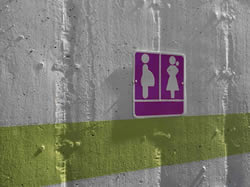Anna Kelsey-Sugg* says workplaces should not view pregnancy as a problem to be dealt with, but they do need to be open to making changes to help women keep working.

Photo: Vítor de Matos
For Michelle, the hardest thing about being pregnant at work was experiencing severe morning sickness — and pretending she was fine.
“I was incredibly sick, but I couldn’t tell anyone,” she says.
“I had to pretend I was OK even when I wasn’t, so no one would find out.”
Things got easier once she’d told her boss and colleagues, but later in pregnancy there were new challenges.
“It was harder for me to get around physically,” she says.
“Just travelling to meetings, walking up stairs — and of course being so tired all of the time — made it harder to get things done as quickly as I had been used to.”
Michelle’s is a common story.
These days many women choose to work for as long as possible before taking maternity leave and, for many, once-easy tasks become more challenging as their due date approaches.
Women also struggle with expectations that they’ll be able to do the same work at the same pace they’ve always done — even when they’re 38 weeks pregnant.
“It’s one of the hardest parts of this whole process — that whole expectation that pregnancy is just like adding aspirin to water, and you go along this process and the child pops out at the end of it,” says Dr Caron Jander, an occupational physician.
That expectation can come from bosses and colleagues — but it can also be self-imposed.
“People are very fearful of seeming like they’re weak if they’re pregnant,” Dr Jander says.
So how do we make workplaces more pregnancy-friendly?
Dr Jander, who’s also a member of the Australasian Faculty of Occupational and Environmental Medicine (AFOEM), has helped develop a guide for employers and women navigating this terrain.
Building pregnancy-friendly workplaces
For workplaces wanting to better accommodate pregnant employees, flexibility is the name of the game.
While workplaces shouldn’t see a pregnancy as a problem to be dealt with, they do need to be open to making changes.
Dr Jander says there are a number of risk factors that are applicable to any workplace, from a corporate environment to a factory floor.
The factors can be categorised as either “solid” or “soft”.
“Solid risks are those that aren’t going to change,” Dr Jander says.
“So if you’ve got certain chemicals or certain pressures, they’re hard cast exemptions from working.”
Soft risks, however, can be changed to suit the needs of different pregnancies.
They include standing time, heat exposure, meeting attendance, rest breaks and pace of work.
“It’s important for people in the workplace to realise that each person’s pregnancy will be different,” Dr Jander says.
“First, look at the workplace, the demands of that and what one can change.”
“Consider key performance indicators and that they might need to be reviewed.”
It’s also important for women to be honest about what they can and cannot do.
Workplaces can use that information to modify a role.
Dr Jander admits that for some roles, change isn’t possible.
An armed guard, for example, can’t take toilet breaks when they’re guarding a vehicle loaded with money.
“And you can’t expect them to be carrying guns,” Dr Jander adds.
“So it really is taking the individual circumstance, and individual workplace and the expectations, and then merging those together.”
Needing help is not a sign of weakness
Dr Jander’s advice to women is to remember that their needs will shift during different stages of pregnancy, and accepting that is not a sign of weakness.
“Accept the fact that, sometimes, you’re not going to be able to do as much as you were doing before, and that things will take longer,” she says.
“The most important thing is to be honest with yourself and, if you’re struggling, ask for help.”
That could be as simple as needing an extra few minutes to walk to a meeting or having to take a rest break.
There are also psychological changes to consider during pregnancy.
These can also be overwhelming, says Dr Emma Symes, a clinical psychologist at the Royal Women’s Hospital in Melbourne.
“The psychological processes of pregnancy parallel the physical aspect,” she says.
“Adjusting to those is sometimes challenging.”
“The symptoms of pregnancy can mimic some of the symptoms of anxiety, such as shortness of breath, nausea or fatigue.”
It’s necessary to recognise the changes that women experience in pregnancy to accept and manage them, Dr Symes says.
“These transitions are so important to the woman’s identity and her sense of being able to make an important contribution within the workplace,” she says.
Dr Jander says these changes can come as a shock to the women experiencing them.
“It’s very challenging, especially for people who have set very high goals in the past,” she says.
“It’s hard, especially in the workplace, where you are so used to being in control of the environment and being in control of your life, and suddenly things are changing around you which you have no control over.”
The right time to tell work
Dr Jander acknowledges that in some workplaces, a woman who reveals she’s pregnant risks certain ramifications, for example around work security.
She’s hopeful the AFOEM guide will help change that.
It outlines benefits to providing a pregnancy-friendly workplace, including retaining talented staff, reducing absenteeism and facilitating return to work following parental leave.
“I’m hoping it will help workplaces realise that there’s actually a benefit in keeping people on with experience and not to see [pregnancy] as being a problem,” Dr Jander says.
She also wants women to realise there are many benefits to speaking up.
“I really want women to feel it’s not a bad thing to tell people you’re pregnant because then people can work with how you are on the day,” Dr Jander says.
“If you’re having a bad day, be honest about it and then people around you can support you.”
“Of course,” says Dr Symes, “it’s [also] the woman’s right not to tell, especially if she’s had reproductive losses or there are sensitivities around this pregnancy.”
What’s most important is to accept that “the road is unpredictable”, Dr Jander says.
“The big thing to remember when you’re pregnant is that you’re not sick, but you’re also not healthy.”
“You’ve got to work with your body and not against it.”
* Anna Kelsey-Sugg is a digital producer with the Australian Broadcasting Corporation in Melbourne.
This article first appeared at www.abc.net.au.











